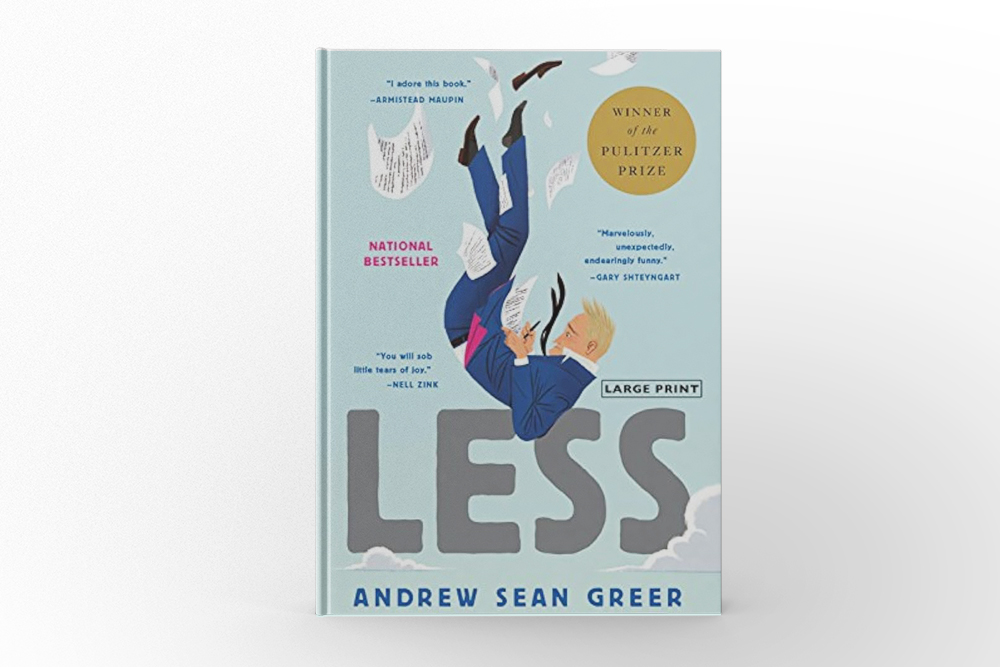“Less” by Andrew Sean Greer is a delightful and poignant novel that explores themes of love, aging, and self-discovery through the eyes of Arthur Less, a struggling novelist. This Pulitzer Prize-winning book takes readers on a humorous and touching journey around the world as Arthur attempts to escape his problems and his ex-boyfriend’s wedding.
Author’s Background
Andrew Sean Greer, born in 1970, is an acclaimed American novelist and short story writer. Greer grew up in Washington, D.C., and later attended Brown University, where he studied writing. His literary career began with the publication of his debut novel, “The Path of Minor Planets,” but it was “The Confessions of Max Tivoli” that brought him widespread recognition. Greer’s works often explore themes of love, identity, and the passage of time. “Less,” published in 2017, won the Pulitzer Prize for Fiction in 2018, solidifying Greer’s reputation as a significant literary voice. His other notable works include “The Story of a Marriage” and “Less Is Lost,” the sequel to “Less.”
In Depth Summary
“Less” follows the story of Arthur Less, a 49-year-old gay writer living in San Francisco. Arthur is facing a midlife crisis: his latest novel has been rejected, and he receives an invitation to the wedding of his former lover, Freddy Pelu. To avoid the wedding and the pain it would bring, Arthur decides to accept a series of literary invitations from around the world, embarking on an extensive overseas trip.
Arthur’s journey begins in New York City, where he interviews a famous writer. From there, he travels to Mexico City for a literary conference, then to Turin, Italy, where he unexpectedly wins a literary award. His travels continue to Berlin, where he teaches a creative writing seminar, and then to Paris, where he reconnects with an old friend. Each destination brings new experiences and challenges, forcing Arthur to confront his insecurities and fears.
In Morocco, Arthur celebrates his 50th birthday in the Sahara Desert, reflecting on his life and the choices he has made. His journey then takes him to India, where he participates in a writer-in-residence program at a Christian retreat. Finally, Arthur travels to Japan to work as a food critic, experiencing the beauty and culture of each place he visits.
Throughout his travels, Arthur encounters a variety of characters, from fellow writers and academics to ex-lovers and new acquaintances. These interactions help him gain new perspectives on his life and his writing. Despite the comedic mishaps and awkward situations he finds himself in, Arthur’s journey is one of self-discovery and personal growth.
The novel’s climax occurs when Arthur returns to San Francisco after learning that his former lover, Robert Brownburn, has suffered a stroke. Arthur’s return home brings a sense of closure and resolution, as he finally confronts his past and embraces his future. The novel ends on a hopeful note, with Arthur finding a renewed sense of purpose and direction in his life.
Themes and Insights
“Less” addresses several profound themes. One of the central themes is the exploration of aging and the fear of irrelevance. Arthur’s journey reflects the anxieties and challenges of growing older, particularly in a society that often values youth and success. Greer delves into the complexities of aging with humor and sensitivity, highlighting the importance of self-acceptance and resilience.
Another significant theme is the search for identity and belonging. Arthur’s travels and interactions with others help him understand his own identity and place in the world. The novel emphasizes the importance of embracing one’s true self and finding connections with others, even in the face of uncertainty and change.
The novel also explores themes of love and relationships. Arthur’s past and present relationships shape his journey, offering insights into the nature of love, loss, and companionship. Greer portrays love as a multifaceted and transformative force, capable of bringing both joy and pain.
Personal Reflections
Reading “Less” is an enjoyable and thought-provoking experience. Greer’s witty prose and vivid characterizations make the reader feel intimately connected to Arthur’s journey. The novel prompts readers to reflect on their own experiences with aging, identity, and the pursuit of happiness.
Greer’s portrayal of Arthur’s struggles and triumphs is both humorous and deeply moving. The novel serves as a powerful reminder of the importance of embracing life’s uncertainties and finding joy in the journey.
Recommendation
“Less” is an essential read for anyone interested in contemporary literature, humor, or the human experience. Greer’s insightful analysis and masterful storytelling make the book both intellectually stimulating and emotionally resonant. It is a timeless classic that continues to captivate readers today.
Impact and Legacy
The impact of “Less” has been profound. The novel is widely regarded as one of the greatest works of contemporary literature and has influenced countless readers, writers, and critics. Greer’s exploration of aging, identity, and love has left an indelible mark on literary and cultural history.
“Less” has also been praised for its nuanced portrayal of LGBTQ+ themes and its contribution to discussions about identity and self-acceptance. The novel’s themes of resilience, humor, and the pursuit of happiness continue to resonate with readers and audiences worldwide, making it a landmark work in the field of literature.
Conclusion
“Less” is more than just a novel; it is a profound exploration of the human condition and the complexities of aging, identity, and love. Andrew Sean Greer’s masterful storytelling and deep insights challenge readers to reconsider their understanding of self-worth, resilience, and the impact of life’s journey. This review of “Less by Andrew Sean Greer” highlights the enduring impact of Greer’s work and the powerful lessons it imparts.
